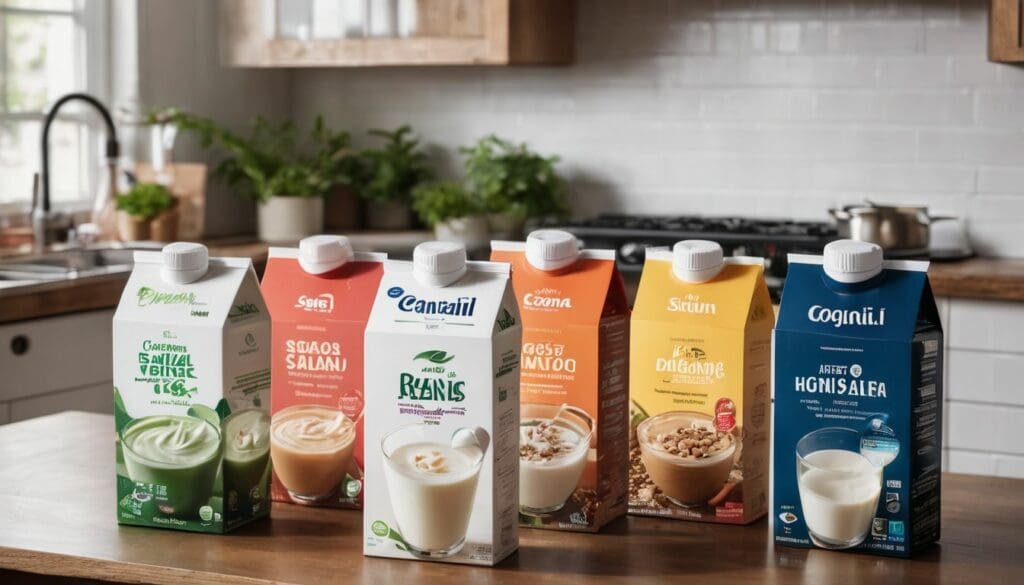As more people seek dairy alternatives, finding the right option can be a challenge. The plant-based dairy sector has seen impressive growth, with an array of milks from almonds to oats filling shelves.
Our article dives into this booming market, giving you insights into choices and trends that are shaping the future of what we pour into our morning cereal. Discover your perfect plant-based match—read on!
Overview of the Plant-Based Milk Market
The plant-based milk market offers a wide variety of options, including pea, rice, almond, wheat, hemp, coconut and soy milk. Each segment of the market presents unique opportunities for growth and innovation in the dairy industry.
Types of plant-based milk (pea, rice, almond, wheat, hemp, coconut, soy)
- Pea milk stands out with its high protein content, making it a popular choice among fitness enthusiasts and those who require a protein-rich diet.
- Rice milk provides a naturally sweet taste and is hypoallergenic, ideal for individuals with dietary restrictions or allergies.
- Almond milk boasts a creamy texture and nutty flavour; it’s perfect for adding to coffee or enjoyed on its own.
- Wheat milk, less known but rich in fibre, can be an excellent addition to a balanced breakfast routine.
- Hemp milk delivers essential fatty acids Omega-3 and Omega-6, contributing to cardiovascular health.
- Coconut milk has a distinct tropical taste and contains beneficial medium – chain triglycerides (MCTs).
- Soy milk is one of the most established nondairy alternatives, offering versatility in cooking and baking due to its stability under heat.
Market analysis of different segments
The plant-based milk market is multifaceted, with various segments experiencing different growth dynamics. Here’s a concise analysis of these segments:
| Type of Plant-Based Milk | Market Share | Growth Factors |
|---|---|---|
| Almond Milk | High | Consumer preference for taste and low calories |
| Soy Milk | Stable | Nutritional benefits and early market entry |
| Coconut Milk | Medium | Tropical taste and cooking versatility |
| Oat Milk | Increasing | Environmental sustainability and barista usage |
| Rice Milk | Low | Hypoallergenic properties and mild taste |
| Pea Milk | Growing | High protein content and allergen-friendly options |
| Hemp Milk | Niche | Omega-3 fatty acids and eco-friendly cultivation |
Global Market Analysis and Statistics
The global market analysis and statistics section will provide an in-depth look at the sales volume, demand, price analysis, competitive landscape, and frequently asked questions related to plant-based dairy products.
It will also delve into the various types of plant-based milk and their market segments.
Sales volume and demand
Sales volume and demand for plant-based dairy products continue to surge as consumer awareness of environmental impact grows. The market sees an increasing need for alternative milk options, reflected in the rising sales figures worldwide. Demand for non-animal milk alternatives such as almond, soya, oat, and coconut is outpacing traditional dairy products in various regions. The trend indicates a significant shift towards sustainable and eco-friendly choices that minimise the environmental footprint typically linked with conventional dairy production.
With sustainability at the forefront of consumer concerns, there is a notable increase in demand for plant-based dairy alternatives across different categories from beverages to yoghurts and cheeses. This heightened interest has led to continuous growth in sales volume which propels further innovation and expansion within the plant-based dairy industry.
Price analysis
Plant-based dairy products offer a range of affordable options, with prices varying depending on the type and brand. When comparing prices of plant-based milk substitutes, almond and soy milk tend to be more cost-effective than pea or hemp milk. Additionally, organic plant-based dairy products are typically priced higher than conventional alternatives due to the production methods involved.
For environmentally conscious consumers supporting conservation efforts, it’s important to consider the price analysis when making purchasing decisions for plant-based dairy items. These individuals may find that opting for more budget-friendly options such as almond or soy milk can help support their sustainable lifestyle without breaking the bank.
Competitive landscape
The plant-based dairy market is witnessing a surge in competition. As demand for nondairy milk, yogurt, and cheese grows, companies are vying for market share. New players entering the alternative dairy products industry seek to claim their stake by offering innovative flavours and sustainable packaging solutions.
Established brands strive to maintain their dominance by investing in research and development for new plant-based food products while also focusing on environmentally friendly production processes.
Market analysis of different segments reveals intense competition among manufacturers of pea, rice, almond, wheat, hemp, coconut, and soy-based products. Sales channels such as B2B and B2C witness a fierce battle for consumer attention with appealing marketing strategies promoting vegan milk and dairy-free options unique to each brand’s identity.
FAQs
Concerns about the production and consumption of plant-based dairy products are common. The following FAQs offer detailed insights:
- What are the environmental benefits of plant-based dairy products?
- Plant – based dairy production typically requires less water and land, reducing environmental impact.
- Are plant – based dairy products nutritionally equivalent to traditional dairy?
- Fortified plant – based milks can provide similar nutrients like calcium, vitamin D, and protein as traditional dairy.
- How can I ensure that I am choosing sustainable plant – based dairy options?
- Look for certifications such as organic or fair trade, and choose locally sourced products where possible.
- Do plant – based dairy products have a lower carbon footprint than traditional dairy?
- Yes, in general, due to lower methane emissions from livestock and reduced energy – intensive processes in production.
- Can I use plant – based milk as a direct substitute for cow’s milk in recipes?
- Yes, but some experimentation may be needed due to differences in taste and texture.
- Are there any allergen concerns with plant-based dairy products?
- Some individuals may have allergies to ingredients commonly used in plant – based milks like nuts or soy.
Growth of Plant-Based Dairy Market
The growth of plant-based dairy products is driven by the increasing demand for non-dairy alternatives, including milk, frozen desserts, and yoghurt. To understand more about this booming market and its impact on sustainable living, keep reading.
Product types (milk, frozen desserts, yoghurt)
Plant-based dairy products encompass a range of options, catering to a growing demand for sustainable and environmentally friendly alternatives. Here’s an overview of the different product types available:
- Milk: Plant-based milk comes from sources such as peas, rice, almonds, wheat, hemp, coconut, and soya. These offer a diverse selection for consumers with varying taste preferences and dietary requirements.
- Frozen desserts: Vegan-friendly frozen desserts made from plant-based ingredients provide indulgent treats without the use of animal products.
- Yoghurt: Nondairy yoghurt options are crafted from plant-based sources like soya or coconut, offering a creamy and satisfying alternative to traditional dairy yoghurt.
Nature (organic, conventional)
Plant-based dairy products come in both organic and conventional options. Organic plant-based dairy is made from ingredients grown without synthetic pesticides, herbicides, or genetically modified organisms (GMOs). On the other hand, conventional plant-based dairy may contain these substances. Organic versions are often more environmentally friendly due to sustainable farming practices and reduced chemical usage. They also offer a cleaner option for those seeking to avoid exposure to potentially harmful chemicals found in non-organic alternatives. However, both organic and conventional plant-based dairy products contribute towards reducing the environmental impact of traditional animal agriculture.
Organic plant-based milk, yogurt, cheese, and other dairy alternatives provide consumers with a choice that supports conservation and environmental sustainability while also offering health benefits associated with clean eating. Conventional options remain popular due to wider availability and lower costs but may not align as closely with environmentally conscious values.
Sales channels
Plant-based dairy products are widely available through various sales channels. These include supermarkets, health food stores, online retailers, and even directly from the manufacturers themselves. With an increasing demand for non-dairy options, plant-based dairy products are becoming more accessible in both physical and digital marketplaces.
Moreover, many plant-based companies have established partnerships with cafes and restaurants to offer their products as part of menu offerings. This has contributed to the expansion of sales channels for plant-based dairy products beyond traditional retail outlets. The accessibility provided by diverse sales channels enables environmentally conscious consumers to easily access and support plant-based options in their effort to contribute towards conservation efforts.”
Region-wise insights
The plant-based dairy market in North America is experiencing substantial growth, driven by the increasing demand for non-dairy milk and other alternatives. In Europe, there is a growing trend towards vegan cheese and yogurt products, with consumers seeking dairy-free options.
Asia Pacific is witnessing a surge in the consumption of plant-based beverages like almond milk and coconut milk, reflecting changing milk consumption patterns in the region.
In Africa and the Middle East, there is a rising interest in non-animal milk products as environmentally conscious individuals seek sustainable alternatives. Latin America has also seen an uptick in the demand for plant-based yogurt and nondairy creamer as part of supporting conservation efforts.
Impact of Global Trends on Plant-Based Dairy Industry
The impact of global trends, such as inflation and supply chain disruptions, on the plant-based dairy industry is significant. To learn more about how these trends are shaping the future of plant-based dairy products, continue reading for valuable insights.
Inflation
Inflation affects the prices of plant-based dairy products, influencing consumers’ purchasing power and affordability. The rising cost of raw materials and production impacts the overall pricing of these environmentally friendly alternatives to traditional dairy items.
As inflation continues to fluctuate, it can lead to changes in consumer behavior and choices, potentially impacting the growth and adoption of plant-based dairy products globally.
The impact of inflation on plant-based dairy extends beyond retail prices; it also influences investment decisions within the industry. Companies may have to adjust their strategies due to increased costs, potentially affecting product development, marketing initiatives, and expansion plans in response to changing economic conditions.
Supply chain disruptions
Shifting to the impact of global trends on the plant-based dairy industry, supply chain disruptions have led to challenges in sourcing and transporting raw materials. These obstacles have resulted in delays in production and distribution of plant-based dairy products.
The unpredictability caused by supply chain disruptions has necessitated agile decision-making and proactive measures to ensure a smooth flow of plant-based milk, yogurt, and other dairy alternatives from farm to table.
This requires collaborative efforts between suppliers, manufacturers, and distributors to mitigate any potential risks associated with these disruptions while meeting the increasing demand for non-dairy options.
The impact of supply chain disruptions on the plant-based dairy market continues to test resilience. However, companies are leveraging innovative strategies such as local sourcing and diversifying transportation channels to counteract these challenges effectively.
Market share of plant-based dairy
Plant-based dairy products have seen a remarkable increase in market share over the past few years. Consumers are increasingly opting for plant-based alternatives, which has led to a significant shift in the dairy industry. The market share of plant-based milk, yoghurt, and frozen desserts has been steadily rising, reflecting changing consumer preferences towards environmentally sustainable options.
In addition to this growth, there has also been an expansion of product offerings within the plant-based dairy sector. This increase in variety and availability is indicative of the growing market potential for these products as they continue to gain traction among environmentally conscious consumers seeking more sustainable and ethical choices.
Plant-based alternatives to meat, seafood, and eggs
The plant-based industry offers a variety of alternatives to meat, seafood, and eggs that are environmentally friendly and sustainable.
- Tasty meat substitutes like tofu, tempeh, and seitan provide a protein – packed alternative to traditional meat products.
- Plant-based seafood options such as algae-based omega-3 supplements and seaweed snacks offer a nutritious and sustainable alternative to conventional seafood.
- Egg replacements like flaxseed, chia seeds, and mashed bananas can be used in baking or cooking as a vegan-friendly option.
Other plant-based foods
Other plant-based foods such as non-dairy yogurt, cheese alternatives, and dairy-free creamers have gained significant traction in the market. Consumers are increasingly seeking out these products as they explore a more sustainable and environmentally friendly diet.
The demand for plant-based options extends beyond milk to include a wide range of dairy alternatives that cater to diverse dietary needs. From almond-based yoghurts to soy-based cheeses, there is a growing variety of innovative products available to those looking for non-animal based food options.
Plant-Based Dairy and the Future
The future of plant-based dairy products is promising, with continuous innovations and consumer insights driving the market. Sustainable growth strategies and increasing support for plant-based options are shaping the future of the industry.
Support for plant-based options
Businesses and consumers increasingly embrace plant-based options, demonstrating growing support for environmentally friendly products. Advancements in technology and consumer awareness have made it easier to access a wide variety of plant-based dairy products including milk, yogurt, cheese, and creamer.
The demand for these alternatives continues to rise as more people seek sustainable food choices that align with their environmental values.
As the popularity of plant-based dairy increases, manufacturers are expanding their offerings to meet consumer demand while addressing the need for eco-friendly food production methods.
With such significant market growth and increasing adoption rates among consumers globally, plant-based options are poised to become even more prevalent in the future.
Conclusion
– Latest news and developments in the plant-based dairy industry have shown a significant impact on consumer choices. Amidst growing environmental concerns, the demand for sustainable alternatives to traditional dairy products is on the rise.
As consumers become more conscious of their ecological footprint, the shift towards plant-based dairy presents an opportunity for positive change. This trend reflects a broader commitment to supporting conservation and environmental sustainability while also enjoying nutritious and delicious options.
With increasing innovation in plant-based dairy products and growing support for sustainable options, it’s clear that this market will continue to expand as environmentally conscious individuals seek out alternatives that align with their values.
FAQs
1. What are plant-based dairy products?
Plant-based dairy products are foods made from plants that serve as alternatives to traditional milk and other dairy items.
2. Why are plant-based dairy products becoming more popular?
Plant-based dairy products are growing in popularity due to health concerns, dietary preferences, and environmental reasons.
3. Can I get the same nutrients from plant-based dairy as regular dairy?
Yes, many plant-based dairies are fortified to offer similar nutrients as found in regular dairy.
4. Are plant-based dairy options available in most supermarkets?
Most supermarkets now stock a variety of plant-based dairy alternatives alongside traditional options.
5. Is there a wide range of flavours available for plant-based milks and yogurts?
Yes, there’s a wide variety of flavours available for plant-based milks and yogurts to suit different tastes.





